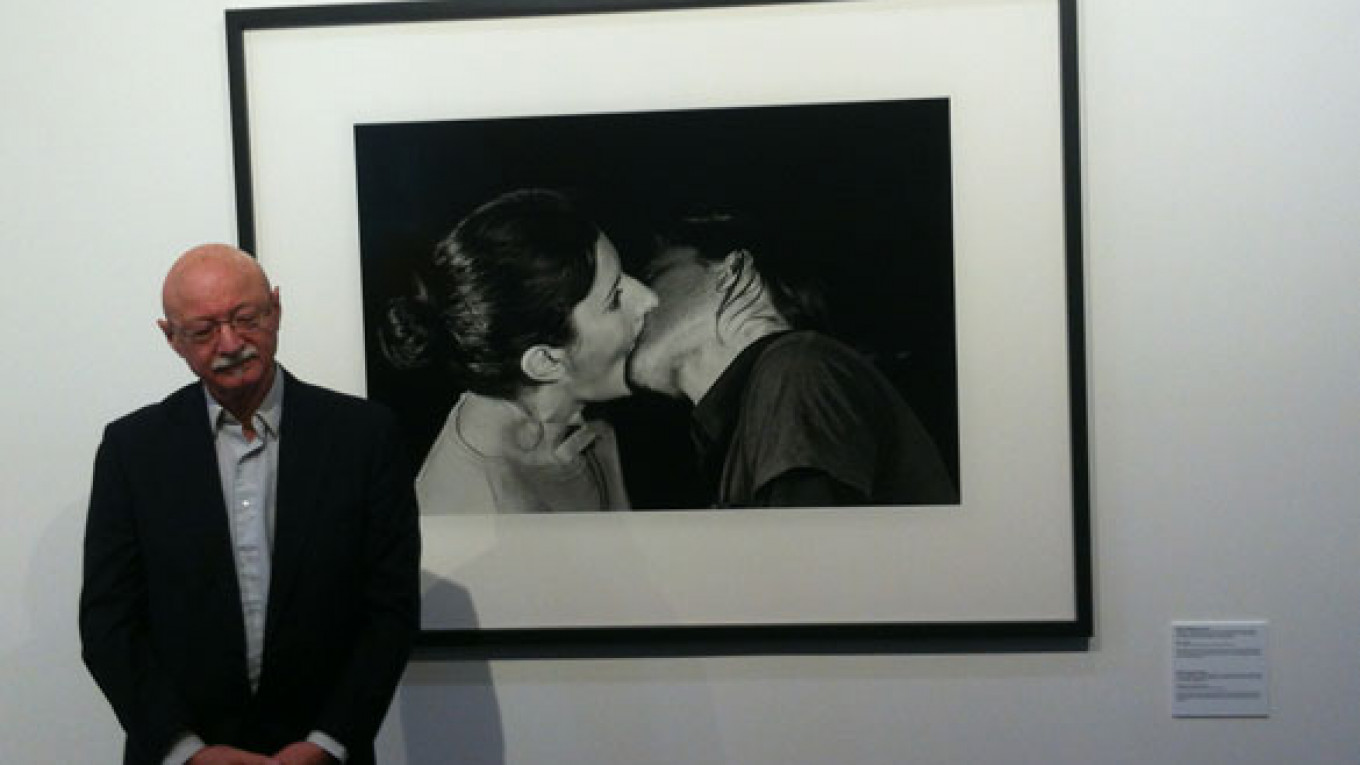On Monday, the Bakhmetevsky Bus Garage, a symbol of Avant-Garde architecture in Moscow, came alive with works by Avant-Garde artists from thoughout Eastern Europe at the opening of "Foreigners Everywhere" (Vezde Chuzhiye), a display of artworks from the collection of Jana and Eduard Pomerants that opened in the Jewish Museum and Tolerance Center, now located on the grounds of the former bus garage.
"It was a challenging and attractive idea for Mr. Pomerants to be in this place … He found it to be a perfect opportunity for him and his collection," said Ami Barak, the Israeli curator of the exhibit. Pomerants first began collecting artwork in Austria, realizing that World War II had left a vacuum in an art market long dominated by Jewish collectors. Pomerants decided to fill this vacuum, collecting pieces from Eastern Europe that focused on alienation and otherness.
About 100 works focusing on the theme of "otherness" are on display at the Jewish Museum in the exhibit "Foreigners Everywhere."
"Pomerants is convinced that art is about a reference to otherness," said Barak. "Eddie likes to tell stories, and this is something the collection reflects very well." In keeping with this penchant for storytelling, the exhibit is divided into six chapters representing different narrative threads, as well as a preamble that both introduces and sums up the exhibit as a whole.
The different chapters, focusing on themes such as "Communism Never Happened", "The World of Typeface", "The Last Performance" and "How to Set a Good Corner" focus not only on different themes but also progress chronologically, showing the development of Pomerantz's collection and his changing preferences over time.
Beginning the exhibit, the "Preamble" holds some of the most recognizable works, such as American artist Joseph Kosuth's work "One and Three Hammers," a tripartite work with physical, photographic and textual representations of a common sledgehammer. Barak said Pomerants considered this to be one of the most important works in the collection. "These works are items which for the collector are more subjective," said Barak about the preamble. "They represent something to him."
Also present in the preamble was a photograph of Marina Abramovic and Ulay, a pair of performance artists whose works pushed the boundaries of performance art in the late 1970s. Other works by this pair were prominently featured in other portions of the exhibit, and they seemed to neatly fall in line with Pomerants' themes of narration and alienation.
"Communism Never Happened," the chapter of the exhibit that seems chronologically at the beginning, focuses on works that discuss the communist governments of Eastern Europe. Particularly emblematic of this chapter was Francis AlЎs' work, "15+1," a piece consisting of 16 plates made from a service used once for a state dinner held by Yugoslav dictator Josip Broz Tito. AlЎs salvaged 15 original plates that he then systematically broke, using one piece from each plate to reconstruct a 16th plate.
"The point is that memory works the same way," Ami Barak said. "We have parts and bits and pieces, and we put it together and we have a reconstitution." The works in the communist section followed in this vein, focusing on memory and false memory, loss and reconstruction. The work for which the chapter is named, "Communism Never Happened" by Romanian artist Ciprian Muresan," is a sculpture of the words in the title made out of broken LP records that had previously contained propaganda songs and speeches from the regime of Romanian dictator Nicolae Ceausescu.
This use of text in art is later expanded upon in the chapter "The World of Typeface," which is devoted to text-based works, many of which consist of unsettling, jarring phrases that are boldly broadcast to viewers. In Claire Fontaine's work, "The Weeping Wall Within Us All," the title phrase is made into bright white neon capital letters. Douglas Gordan's work "Eye + Eye (Wall Text)," the artist has first painted the phrase "the right eye won't tell what the left eye has seen," in black text, followed by "the right eye cannot see" underneath in white text surrounded by an ominous black cloud.
Apart from the jarring slogans in the textual chapter, the chapter "Last Performance" focused on performance art that historically was considered to push the limits of society's tolerance. At this point, art and society has advanced so far since the time that these works were created that they no longer seem particularly shocking, yet it is fascinating to look at these monuments to the daring of the artists of the past.
One particularly amusing piece is a photograph of Austrian artist Valie Export's performance work "Aus der Mappe der Hundigkeit — Subjekt F." In this work from the 1960s, Valie Export walked various male partners around central Vienna, keeping her partners on a leash and having them crawl like dogs. The photographs do an excellent job of capturing the shock and amusement of pedestrians who witnessed this demonstration, intended to symbolize the reversal of male domination over women. This is one work that still holds up well with time, and it would be intriguing to see a similar experiment conducted in modern Moscow.
About 100 works are presented in the exhibit, comprising about half of the total Pomerants collection. Borukh Gorin, the chairman of the board of the Jewish Museum, said he hoped that "in the future these materials can become a part of the permanent collection [of the Jewish Museum]." Borukh said it was irrelevant that the materials were not explicitly related to Jewish history, noting that the institution was also home to the Center for the Avant-Garde and hoped to attract visitors with a wide variety of temporary exhibits.
The exhibit "Foreigners Everywhere" will be on display until Nov. 4 at the Jewish Museum, 11 Ulitsa Obraztsova, Bldg. 1A. Metro Marina Roshcha.
Contact the author at [email protected]
A Message from The Moscow Times:
Dear readers,
We are facing unprecedented challenges. Russia's Prosecutor General's Office has designated The Moscow Times as an "undesirable" organization, criminalizing our work and putting our staff at risk of prosecution. This follows our earlier unjust labeling as a "foreign agent."
These actions are direct attempts to silence independent journalism in Russia. The authorities claim our work "discredits the decisions of the Russian leadership." We see things differently: we strive to provide accurate, unbiased reporting on Russia.
We, the journalists of The Moscow Times, refuse to be silenced. But to continue our work, we need your help.
Your support, no matter how small, makes a world of difference. If you can, please support us monthly starting from just $2. It's quick to set up, and every contribution makes a significant impact.
By supporting The Moscow Times, you're defending open, independent journalism in the face of repression. Thank you for standing with us.
Remind me later.






